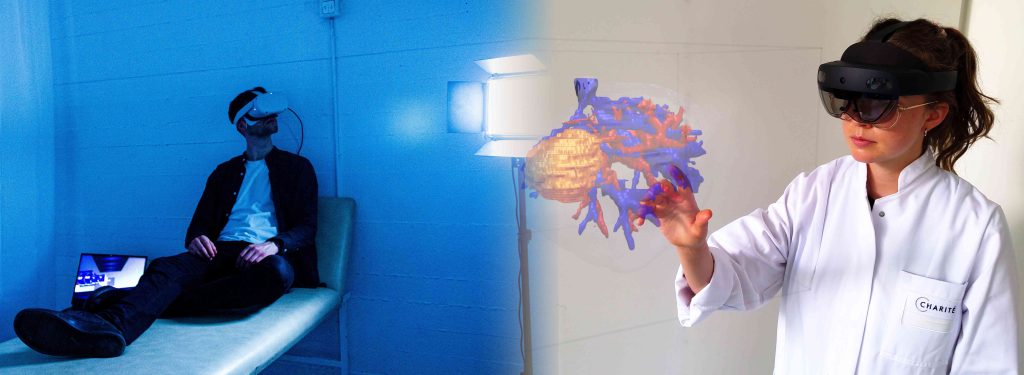
PROJEKTABSTRACT
The project “4D Imaging” investigates new types of imaging technologies that interconnect images, space, and movement. By capturing, processing, and transmitting data about the physical world in real time, 4D technologies encompass a wide range of applications from extended reality, computer vision or techniques for visualizing motion, such as volumetric videos. 4D images gain significance in operational contexts where human movements and gestures are rendered computable to engender spatial actions such as in cultural production and medicine.
In the context of the project, 4D Imaging is defined as a form of digital visuality intertwining image, action and space that transforms the way humans interact with each other and their environment. The project responds to the growing need in science and culture to understand, utilize and design complex image techniques and seeks to empower users by facilitating the transfer of critical and reflective skills from image and media theory to practical application contexts. The projects focus on cultural production and medicine, where 4D Imaging promises the digital capturing, visualization, and accessibility of spatially complex situations, such as of a performance or of anatomical structures.
The project consists of two case studies: “Live Performance in 4D” (University of Bonn) and “Learning to See the Body” (Charité – Universitätsmedizin Berlin). They examine the socio-historical conditions of 4D imaging, systematize necessary image and media competencies, and develop guidelines for designing and applying specific 4D technologies. In addition to its practice-based approach, the project contributes to a closer collaboration between image theory and image practice to address the societal challenges posed by innovative 4D imaging techniques.
Team
Kathrin Friedrich is professor of Media Studies/Digital Media Culture at the University of Bonn. Her research at the intersection of Media and Science Studies currently focuses on the interventional use of digital technologies in performance, agriculture and medicine.
Contact:
k.friedrich@uni-bonn.de
Social media: Academia, Researchgate, ORCID
Moritz Queisner is a professor in the field of digital health at Charité – Universitätsmedizin Berlin. He is an expert in health technologies with a focus on future applications, technology assessment, knowledge transfer, and design principles. Moritz has an academic background in in media studies, science and technology studies and digital health.
Contact:
moritz.queisner@charite.de
Social media: Twitter, Academia, Google Scholar, LinkedIn, ORCID.
Carolin Schabbing is scientific assistant in the field of media studies and digital media applications at Universität Bonn. She is an expert in the field of user experiences an human centered design with a focus on multimedia and virtual reality applications in spatial brand experiences and cultural live performances. Carolin has an academic background as an experience designer (M.A.) in integrated design and design theory and research.
Contact:
c.schabbing@uni-bonn.de
Social media: Instagram, LinkedIn
Karl Eisenträger is a PhD-Candidate at Charité – Universitätsmedizin Berlin.
He holds a M.Sc. in Psychology. In his dissertation he investigates the use of virtual reality in surgery.
Contact:
Karl.eisentraeger@charite.de